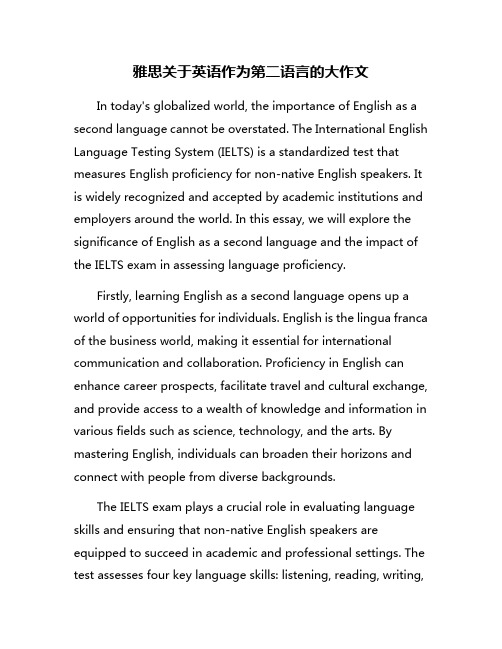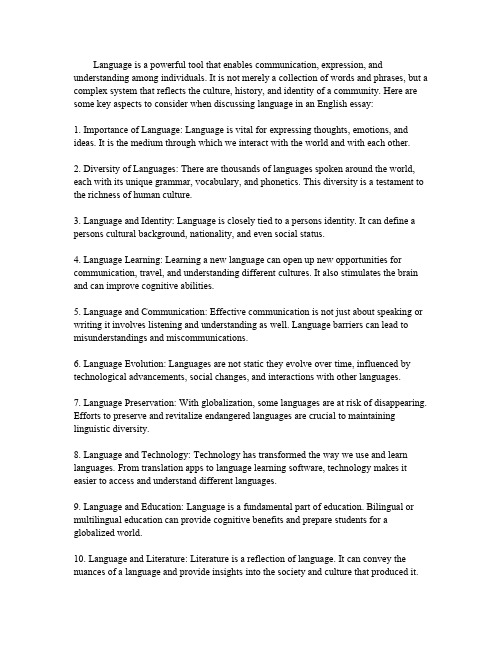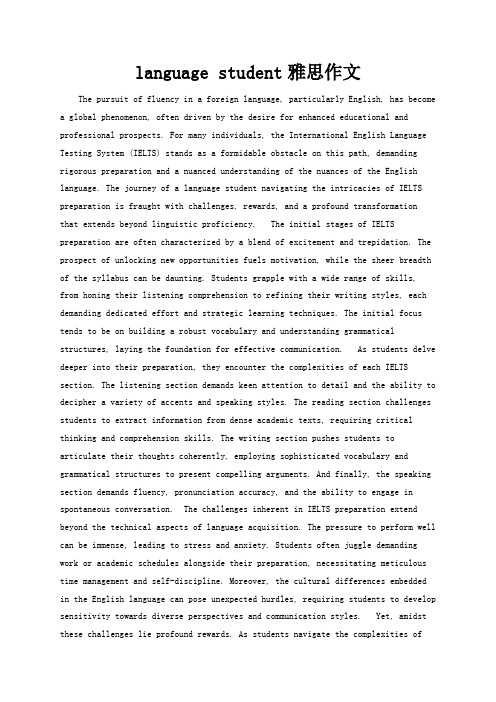雅思作文思路-Language
每年有几种语言消亡,有些人觉得这不重要 雅思英语作文languages die out

Every year several languages die out. Some people think that this is not important because life will be easier if there are fewer languages in the world.To what extent do you agree or disagree with this opinion?Give reasons for your answer and include any relevant examples from your own knowledge or experience.You should write at least 250 words.Sample Answer 1:(Disagreement)It is a fact that there are a lot of languages in this world, but every year several of the languages just disappear. A group of people believe that the extinction of some languages is not a crucial problem since communication will be more effective with fewer languages. Although some people think that the extinction of some languages is not a serious problem, I do believe that the diversity of the world languages has a lot of benefits for the individual and the society as well.To begin with, it is undeniable that out of hundreds of languages that have existed, fewlanguages extinct every year. It is believed that the disappearance was due to the globalisation and the westernisation of the European and American, which have forced people to communicate in International languages such as English, German or French. Other people have an opinion that the extinction of the languages is not a serious threat to the world since most of them that die out are minority languages which are spoken by several people. Therefore they would not make a significant impact on the world. Besides that, the usage of several international languages has made business interaction ordiplomatic negotiation among nations or continents become easier.On the other hand, the uncountable number of languages that have existed shows the uniqueness of the world cultures. It is necessary to maintain the diversity of the world languages since each of the languages represents the identity of a community or a tribe. Besides that, although some of the languages might only be spoken by several people, it has an important function. Many of the traditional myths are written or documented in the minority languages,and if they die out, then the culture would also be lost.In conclusion, I personally disagree with the opinion that with only several languages that exist in the world, life will be easier. I believe that the variety of languages shows the richness of the world civilisations and they should be passed to the next generation.Written by - Darwin LesmanaModel Essay 2:(Agreement)Perhaps the human is the only living creature that has distinctive and diverse languages to communicate each other. The primary means of languages is to communicate effectively. Each nation, tribes and country has their unique language and these languages and their formations were quite different than the way see them now. If communication is the main reason we have our own languages, I would opine that the fewer languages are far better for effective communication and hence we should not worry that much because some of the languages are getting extinct.Some would argue that a language preserves the culture, tradition and history of a group of people. That’s true to a certain extent and it is not impossible to decipher the history when the language is no longer alive. For instance, have not our researchers in modern time deciphered the manuscripts and written symbols of cultures and civilisations that no longer exist?The changes of languages and their evaluation cannot be prevented. Even the modern English we nowadays use is much different than it had been a century ago. Language changes because people need better and easiercommunication way. From this regards, if some rich and modern languages are used throughout the world, the communication among people would be better than ever. This would reduce the language and cultural barrier we have in our world.Languages which are getting lost are mostly spoken by fewer people. It is not uncommon that only a few people speak a particular language and that’s why it is in danger. Most of such languages are spoken by a tribe and people of this tribe have developed in terms of education and lifestyle and have accepted a new language.In some cases, we should put more priority on people’s life standard rather than focusing on the language they speak.Finally, modernization is a natural trend and we cannot prevent it. The prominent languages of the world would prevail and they would be spoken and used by more people as a natural trend. The fewer the languages, richer and more effective they would be.In conclusion, we should foster and accept the diversity of languages because of its uniqueness and tradition but should also accept the natural trends of modernization and evolving nature of alanguage. We should not worry too much about a language’s disappearance and should accept the fact that fewer languages in the world mean better communication and better understanding among nations.Sample Essay 3: (Disagreement)Language bridges individual across the globe. Annually, several languages are eliminated in this modern society. Some sociology experts believe that people can live easily if they can communicate clearly with other nationalities. They suggest that few languages must be studied, however, I do not agree with this beliefbecause other languages contribute to the ancient culture and civilisation. We can never deny others, who believe that studying several languages are stressful and difficult. For example, understanding Nihonggo requires intensive study of words and idioms. In addition, their structure in writing is different from other countries. As a result, it becomes a burden on other people to study the language they are not used to. Moreover, they become exhausted and confused if they are not familiar with the country’s culture. Accordi ng to others, studying single language removes communication barriers across the world. As an example, usingEnglish as a capital language unites a majority of people around the world. People using this language can easily understand each other because it is normally taught in school. If people uses single language then the communication will not b a problem. However, in other parts of the country, language is considered part of their culture. As an example, civilisation in Egypt is born because of language and communication. More so Spain has one language because it resembles their identity and pride. Language cannot be easily taken from other countries because of its historical significance. People should not be encapsulated in a limitedlanguage. To conclude, other people consider studying fewer languages as the uncomplicated task; however certain languages resemble historical value and should be given importance.Written by - Chino A. BoqueModel Answer 4: (Disagreement)In today's modern world, we are constantly combating with the issue of disappearance of languages around the globe on newspaper. Some people are of the opinion that it will not cause any negative impacts on us; in return, they can lead a simple lifestyle as they do notneed to learn so many languages in the twenty-first century. However, I strongly disagree with this view because it will bring numerous detrimental side effects to our lives.Language, undoubtedly, is the identity of one's race which every race in the world has its own language to speak on. It is, in fact, should be learnt by every individual so that they can pass on their specific language to their descendants. Nevertheless, a study conducted in India suggested that every Indian in India knows how to speak Tamil whereas not all Indians in Malaysia can communicate with their friends orfamily using Tamil. Thus, it is apparent that we will soon end up with only one or two languages if we do not take effective preventive measures to avoid the disappearance of languages from happening.Certainly, fewer languages in the world would mean many cultures and traditions will be eventually lost in the near future. It is because cultures and traditions of one's race can only be well-learnt through its own language. Without learning a specific language which will finally die out one day, some cultures which are the key feature of a race will be forgotten by themselves.According to a recent research, it has shown that more and more cultures and traditions are losing at a fast pace following the disappearance of some languages in some countries in the past ten years. Thus, when languages die out, the cultures and traditions will inevitably disappear from this world too.In conclusion, I believe the loss of numerous languages will definitely cause many unanticipated negative impacts on our lives and hence we should take some useful and yet effective ways to protect them and pass on to our children.Written by - Lee Wing QeenModel Essay 5: (Disagreement)In our modern society, the question whether fewer languages in the world are better and easier for our daily life has been widely discussed. A fair portion of people believes that it is important to keep as many languages as we can, while others hold the opposite point of view. As for me, I side with the former one.First, different languages present their own history and culture. For example, the Chinese language is similar to the one used in the oldtimes. Although China has thousands of years of history, since the language has been exited all the time, it is not hard to understand our history and culture well. Once the Chinese language dies out, people who speak other languages, such as English and French, would not know what Chinese festivals holidays celebrate for, and what the meanings of all architectures in Forbidden City. In this case, languages are the crucial way to learn culture and history. Therefore, we should keep the diversity of languages in the world.Second, if only a few languages are used in our world, we would lose numerous precious of knowledge written in certain languages. For instance, if English, French, Spanish and Chinese become the only four languages using in the whole world, it is impossible for people to understand well about how to make Japanese tea, and how to cook Japanese and Korean food, such as sushi and kimchi. It might be convenient and easy for people to communicate in our daily life by using only a few languages. However, if it happens, we would only know less information written by a limited number of languages.In conclusion, we should try our best to keep as many languages as we can to prevent culture and knowledge lost.Model Answer 6: (Agreement)It is true that numerous languages are disappearing in every year due to the greater influence of international language. Even though this phenomenon creates negative impacts on society, I am of the opinion that it makes life far easier and more convenient in much broader ways.To begin with, communication of people from different nations would be much more easy and effective, if there are fewer languages. A case in point is that people do not need to learn new vernacular languages of others as well as never face the difficulties of the language barrier. This would result in an increase in people’s basic ability to socialise and interact with each other on a day-to-day basis. For example, it is often the case that people communicate with foreigners through the social network with the only help of English language, which is considered as the international language andthey also share their views and ideas that are global in scale.In addition, this trend cuts down social and cultural discrimination among people to a great extent as the majority of them use a common language in order to maintain the social relationship irrespective of country, race, religion, economic status and so on. For instance, in England, there is a little social-status difference among English people, whereas Indians show remarkable social, cultural and religious discriminations owing to a large number of local languages for each state.However, there is another line of thought that, it destroys traditional art forms of entertainment, which are predominantly based on local language and culture. To make it more clear, people cannot enjoy the performing art forms of a place, if they are not familiar with vernacular language so it is vital that government should take measures to prevent further deteriorating effects.In conclusion, fewer languages always help to improve communication process across the world and foster community spirit and unityamong individuals, despite some detrimental effects on local art forms and cultures.。
高三英语作文带翻译:language语言

Language is essential; language is what we use to communicate among others. it is something that joins us just as strongly as it separates us. There are many different “languages” in the world but really they are all bound by certain rules, they all have a format that they follow, all of them have nouns, verbs, tenses, and
adjectives.
Language is almost like a math, the point of it is that when you speak, you try to reach a conclusion with a different person, and in math you use equations to solve problems and reach conclusions, one is numbers the other is words.
语言是必不可少的;我们所使用的语言是和他人沟通的方法。
它参与我们并且强力的把我们分类。
世界上有许多不同的“语言”都是由一定的规则约束,他们都有一个他们遵循的格式,它们都有名词,动词,形容词,动词时态。
语言就像是数学,这一点是当你说话的时候,你试着和不同的人得到数学结论,在数学上你用方程解决问题并得出结论,一个是数字另一个是其他。
雅思写作语言文化类范文

雅思写作语言文化类范文范文一With the fast pace of globalization, the whole world has become a global village with combination of different cultures. What are the reasons for losing a variety of languages and cultures? Think of some solution to alleviate the problem.With the pacing the world, globalization is no longer a myth. Nowadays, it is growing at a terrific speed. Each country has combined to be a global village. Languages and cultures are penetrating each other and we are losing a variety of them. There are several reasons for this phenomenon.The first reason can be seen is that the great flow of migration. Globalization has helped open the world’s borders, permitting more and more people in small countries to immigrate to other big countries. As the need of working and living, they have to mix new culture with their own culture and use the new language more often. Gradually, they lose their own custom.The development of technology and economy, however, is the most important factor. The high-tech products in developed countries possess a leading position in the international market due to globalization. Almost all the people in the world are enjoying the benefits of these products and more multinational corporations are emerging. This is not only a high-tech penetration but also a cultural invasion. People begin to be interested in these developed countries in an earlier age. They learn the language and culture of these countries, which will aid them to find a good job in the multinational corporations.To alleviate the dilemma, the following suggestions should be taken into consideration. In each country, a variety of cultural festivals should be held at a regular time such as poem or music festivals. Through this way, the traditional culture will be kept from generation to generation. Government should raise the consciousness of preserving traditional culture for inhabitants.In the final analysis, we should keep our own language and culture with the fastpace of globalization.范文二Traditional arts civilized a nation. Do you think the government should subsidize musicians, artists, or drama companies? What should government do?Traditional arts, as valuable cultural relics of a nation, are disappearing far away from the modern society. China, as one of the highly-civilized countries in the world, abound in various forms of traditional arts, such as painting, calligraphy, music, architecture and dramas, which are not only our national cultural treasures, but also a rich fortune of the world.As esse nce of a local culture, traditional arts reflect a nation’s artistic talents and traditions. For example, water-color painting depicts a harmony between people and nature. Architecture illustrates a nation’s aesthetic value and religious belief. Cathedrals, highlighted by Gothic style in the Medieval, represent Christianity. Pagodas, totally different from cathedrals stylistically, are a symbol of Buddhism. Peking Opera describes the history of our country.However, traditional arts are leaving contemporary people further and further away, one of the main reasons for which is that the authorities concerned and some institutes lack funds and professionals, which are quite essential to the research and promotion of the traditional culture. Another radical reason should be attributed to the impact of western cultures on traditions. Young people, especially youngsters, are addicted to western music like rock and roll, without any knowledge about traditional musical instruments. With the economic globalization, traditional culture and arts will be in the danger of assimilation. How to maintain and develop traditional arts becomes the biggest concern of a government.Firstly, the government should lay a fund for the research and promotion of traditional arts. Secondly, the research institutes and universities should work out a long-term developing scheme, organizing systematic research on traditional arts. Arts belong to a nation and the whole world as well. The prosperity of traditional arts willdiversify the culture of the world.范文三What are the purposes of the places like museums, and how should they be funded?It is well known that a museum is building to display a collection of artistic, historical, cultural or military objects. Undoubtedly museums can have a variety of purposes in the city; I think two roles the museums play can illustrate they are worth visiting.Visiting museums is informative. Once I visited a military museum in Beijing, China, soon I learned that an ancient warrior might have outfought his enemies in combat if he had had great strength while a modern soldier should be armed with sophisticated weapons. Therefore present soldiers should spend far much time on studying modern technology instead of building up muscles. Likewise, if you visit other museums, you will have a better perception on a certain field, because you can witness some genuine objects which cannot be seen on books.In addition, a museum can function to cultivate one’s sense of patriotism. In China, schools often organize trips to some historical museums. When the students learn that many years ago, a number of countries invaded China robbing treasure and killing Chinese civilians, promptly they will establish a strong sense to defend the nation, revealing that only a strong motherland can give them pride and safety.Now we talk about how to fund a museum. A museum can never be considered as a financial burden to society. I suggest that the government should invest a small amount of money on advertisements for the museums in the city. For example, ads of the museums should be forwarded on the travel brochures or maps of the city. Consequently tourists come and admission tickets are collected. Both reputation and funds are earned.In brief, museums should play a role as an instructive means of the city and incomes from admission can keep them running properly.。
雅思关于英语作为第二语言的大作文

雅思关于英语作为第二语言的大作文全文共3篇示例,供读者参考篇1English as a Second Language (ESL) has become an essential aspect of education in today's globalized world. With the prevalence of English as the lingua franca for international communication, the ability to speak, read, write, and understand English has become a valuable skill for individuals in diverse fields such as business, technology, science, and academia. This essay will discuss the importance of English as a second language, its benefits, challenges, and the role of education in promoting ESL proficiency.To begin with, English proficiency opens up numerous opportunities for individuals in terms of job prospects, career advancement, and access to higher education. In many countries, English is a requirement for entry into universities, securing employment in multinational companies, and participating in global conferences and events. Additionally, English fluency enhances communication skills, cultural understanding, and promotes intercultural connections among people from different backgrounds.Moreover, learning English as a second language provides cognitive benefits such as improved problem-solving skills, critical thinking, and creativity. Studies have shown that bilingual individuals have better executive functioning abilities, enhanced memory, and are more adaptable to new environments. This is because learning a new language challenges the brain to think in different ways, enhancing cognitive flexibility and mental agility.Despite the numerous benefits of learning English as a second language, there are also challenges that learners may face. These include difficulties in pronunciation, grammar, vocabulary, and cultural nuances. Additionally, learners may feel anxious or self-conscious about making mistakes while speaking or writing in English. However, with practice, perseverance, and the support of teachers, peers, and language learning resources, these challenges can be overcome.Education plays a crucial role in promoting ESL proficiency through effective teaching methods, curriculum design, and assessment tools. Teachers should create a supportive and inclusive learning environment that encourages students to actively engage with the language through interactive activities, group discussions, and real-life scenarios. Furthermore,integrating language learning with technology can enhance students' motivation, autonomy, and language acquisition skills.In conclusion, English as a second language is a valuable skill that offers numerous benefits for individuals in their personal, academic, and professional lives. Despite the challenges that learners may encounter, with dedication, practice, and the right support, anyone can become proficient in English. Education plays a pivotal role in promoting ESL proficiency and preparing learners for success in the globalized world. As the demand for English proficiency continues to grow, acquiring language skills will be a key asset for individuals to thrive in an interconnected and multicultural society.篇2English as a Second Language: Benefits, Challenges, and Strategies for SuccessIntroductionEnglish has become the global lingua franca, with millions of people around the world learning it as a second language. As a result, the demand for English as a Second Language (ESL) education is increasing rapidly. In this essay, we will explore the benefits of learning English as a second language, the challengesthat learners may face, and strategies for success in ESL education.Benefits of Learning English as a Second LanguageThere are numerous benefits to learning English as a second language. Firstly, English is the most widely spoken language in the world, and being able to communicate in English opens up a world of opportunities for individuals in terms of employment, education, and travel. Secondly, learning English can enhance cognitive abilities, such as problem-solving skills and creativity. Finally, being proficient in English allows individuals to access a wealth of information and resources available in English, such as books, websites, and academic journals.Challenges of Learning English as a Second LanguageWhile there are many benefits to learning English as a second language, there are also challenges that learners may face. One of the main challenges is the complexity of English grammar and vocabulary, which can be difficult for non-native speakers to master. Pronunciation can also be a challenge, as English has a wide range of sounds that may not exist in the learner's native language. Furthermore, cultural differences and differences in communication styles can create barriers to effective communication in English.Strategies for Success in ESL EducationIn order to succeed in ESL education, it is important for learners to develop effective strategies for language acquisition. One strategy is to immerse oneself in the English language as much as possible by watching English-language movies, listening to English-language music, and readingEnglish-language books. Another strategy is to practice speaking English regularly with native speakers or other learners. Additionally, setting specific, achievable language learning goals can help learners stay motivated and track their progress.ConclusionIn conclusion, learning English as a second language offers a wide range of benefits, but also presents challenges that learners must overcome. By developing effective strategies for language acquisition and staying motivated, individuals can succeed in ESL education and reap the rewards of being proficient in English. As the demand for English language skills continues to grow, it is more important than ever for individuals to invest in their English language education.篇3Title: The Importance of English as a Second Language in the IELTSIntroductionEnglish is currently considered the global lingua franca, with over 1.5 billion people speaking the language. It has become an essential tool for communication, commerce, and education around the world. This has led to an increasing number of people learning English as a second language, particularly for those who are looking to pursue higher education or work opportunities in English-speaking countries. In this essay, we will explore the importance of English as a second language in the context of the International English Language Testing System (IELTS).The IELTS is a standardized test that measures the proficiency of non-native English speakers in the language. It is widely accepted by universities, colleges, and employers in English-speaking countries as a means to assess an individual's English language skills. The IELTS consists of four main components: listening, reading, writing, and speaking. Each component evaluates different aspects of the test-taker's language abilities, such as comprehension, vocabulary, grammar, and pronunciation.Importance of English in the IELTSEnglish proficiency is crucial for succeeding in the IELTS, as it is necessary to understand and respond to the test questions accurately. Without a solid foundation in English, test-takers may struggle to comprehend the reading passages, follow instructions in the listening section, express their ideas coherently in writing, and communicate effectively in the speaking test. Therefore, developing strong English language skills is essential for achieving a high score in the IELTS.One of the main reasons why English is important in the IELTS is the writing component. Test-takers are required to write essays and reports on various topics, which must demonstrate an advanced level of English proficiency. This includes using a wide range of vocabulary, complex sentence structures, and coherent arguments. Without a good command of English, it can be challenging to express ideas clearly and concisely, which may result in a lower score in this section.Furthermore, English is also crucial for the speaking component of the IELTS. Test-takers are required to engage in a conversation with the examiner on a range of topics, express their opinions, and respond to questions. Fluency, pronunciation, and vocabulary are important factors that are assessed during the speaking test. Without a good grasp of English, test-takersmay struggle to communicate effectively, leading to lower scores in this section.In addition to the writing and speaking components, English proficiency is also essential for the listening and reading sections of the IELTS. Test-takers need to be able to understand a variety of accents, follow complex lectures, and comprehend academic texts. Without a thorough understanding of English, test-takers may find it difficult to answer the questions accurately, which can affect their overall score.ConclusionIn conclusion, English plays a crucial role in the IELTS as a second language. Developing strong English language skills is essential for succeeding in the test and achieving a high score. Test-takers need to focus on improving their vocabulary, grammar, pronunciation, and fluency to perform well in all four components of the IELTS. By recognizing the importance of English in the IELTS, test-takers can work towards improving their language skills and enhancing their chances of success in the test.。
雅思作文语言的消失利弊

雅思作文语言的消失利弊英文回答:Language is a fundamental aspect of human communication and plays a crucial role in our daily lives. However, with the rapid advancement of technology and the increasing globalization, there is a concern that certain languages might disappear. In my opinion, the disappearance of languages has both advantages and disadvantages.On the one hand, the disappearance of languages can lead to a more efficient and unified global communication system. With fewer languages spoken, it would be easier for people from different countries to understand each other. For example, English has become a global lingua franca, enabling people from different linguistic backgrounds to communicate effectively. This facilitates international trade, diplomacy, and cultural exchange.Furthermore, the disappearance of languages can alsopromote cultural assimilation and unity. When people speak the same language, they are more likely to share similar values, beliefs, and traditions. This can foster a sense of belonging and bring communities together. For instance, in countries where a dominant language is spoken, people are more likely to have a common cultural identity and national unity.However, on the other hand, the disappearance of languages can also result in the loss of cultural diversity and heritage. Each language carries unique cultural knowledge and traditions that might be lost forever if the language becomes extinct. For example, indigenous languages often contain valuable information about local ecosystems, medicinal plants, and traditional practices. Losing these languages means losing valuable knowledge and wisdom.Moreover, language is closely tied to one's identity and sense of belonging. When a language disappears, the speakers of that language might experience a loss of cultural identity and a sense of disconnection from their heritage. This can lead to feelings of isolation andmarginalization. For instance, many indigenous communities around the world struggle to preserve their languages as they face pressure to adopt dominant languages.中文回答:语言是人类交流的基本方式,对我们的日常生活起着至关重要的作用。
雅思关于英语作为第二语言的大作文

雅思关于英语作为第二语言的大作文In today's globalized world, the importance of English as a second language cannot be overstated. The International English Language Testing System (IELTS) is a standardized test that measures English proficiency for non-native English speakers. It is widely recognized and accepted by academic institutions and employers around the world. In this essay, we will explore the significance of English as a second language and the impact of the IELTS exam in assessing language proficiency.Firstly, learning English as a second language opens up a world of opportunities for individuals. English is the lingua franca of the business world, making it essential for international communication and collaboration. Proficiency in English can enhance career prospects, facilitate travel and cultural exchange, and provide access to a wealth of knowledge and information in various fields such as science, technology, and the arts. By mastering English, individuals can broaden their horizons and connect with people from diverse backgrounds.The IELTS exam plays a crucial role in evaluating language skills and ensuring that non-native English speakers are equipped to succeed in academic and professional settings. The test assesses four key language skills: listening, reading, writing,and speaking. By measuring proficiency in these areas, the IELTS exam helps institutions and employers gauge an individual's ability to communicate effectively in English.Furthermore, the IELTS exam fosters standardized testing practices and promotes fair and objective evaluation of language proficiency. The exam is designed to be rigorous and comprehensive, ensuring that test takers are challenged and held to high standards. By setting a benchmark for English proficiency, the IELTS exam helps to maintain quality and consistency in language assessment.In conclusion, English as a second language is a valuable asset that can enhance opportunities for individuals in today's globalized world. The IELTS exam plays a crucial role in assessing language proficiency and ensuring that non-native English speakers are well-prepared for academic and professional success. By mastering English and passing the IELTS exam, individuals can unlock a world of possibilities and make meaningful contributions to the global community.。
雅思c11-t3大作文,范文

雅思c11-t3大作文,范文一、开头。
Well, when it comes to learning a foreign language, there are some interesting viewpoints out there. Some folks think that the sole purpose of cracking open a language textbook is either to jet off on a holiday to afar flung land or to land a job overseas. But others are like, "Nah,there's more to it than that!" And I'm here to have a good old chat about both sides of this argument.二、一方观点:学习外语只为旅行或工作在国外。
On one hand, those who believe that traveling or working abroad are the only reasons for learning a foreign language do have a point. Let's take travel first. Picture this: you're strolling down the cobbled streets of Paris, and instead of fumbling around with a phrasebook or relying on hand gestures, you can smoothly ask for a "croissant" or directions to theEiffel Tower in perfect French. It just makes the whole travel experience so much more enjoyable and immersive.When it comes to work, in our globalized world, many companies are expanding overseas. If you want to be part of that international business crew, being able to communicate in the local language of the target market is like having a golden ticket. For example, if you're a marketing guru aiming to sell products in Germany, knowing German can help you understand the local consumers better, create more appealing ads, and build stronger relationships with clients. It seems that for these practical matters, learning a foreign language is just a means to an end.三、另一方观点:学习外语还有其他原因。
雅思写作大作文范文 雅思写作讨论双方观点 minority language少数民族语言.doc

雅思写作大作文范文雅思写作讨论双方观点 minority language少数民族语言今天我们雅思写作大作文范文的系列文章将以少数民族语言minority language为主题,来研究雅思写作讨论双方观点类的文章该怎么写。
雅思写作大作文题目Several languages are in danger of extinction because they are spoken by very small numbers of people. Some people say that governments should spend public money on saving these languages, while others believe that would be a waste of money.Discuss both these views and give your opinion.一部分语言正处于灭绝的危险中,因为只有很少的人说它们。
一些人认为政府应该花费公共资金来拯救这些语言,而其他人则认为这是在浪费钱。
讨论双方观点,并给出你自己的意见。
雅思写作大作文范文开头段 IntroductionIt is true that some minority languages may disappear in the near future. Although it can be argued that governments could save money by allowing this to happen, I believe that these languages should be protected and preserved.事实如此,一些少数民族的语言可能在不远的将来消失。
虽然有理由认为政府放任这种事情发生能够省钱,但我相信这些语言应该被保护起来。
主体段一 Main body 1There are several reasons why saving minority languages could be seen as a waste of money. This article is from Laokaoya website. Do not copy or repost it. Firstly, if a language is only spoken by a small number of people, expensive education programmes will be needed to make sure that more people learn it, and the state will have to pay for facilities, teachers, and marketing. This money might be better spent on other public services. Chinese translation from laokaoya website. Secondly, it would be much cheaper and more efficient for countries to have just one language. Governments could cut all kinds of costs related to communicating with each minority group.拯救少数民族语言因为以下原因被看作是浪费钱。
雅思写作之大作文思路角度分析

雅思写作之大作文思路角度分析
1.重视以人为本的理念:无论什么样的作文题目,都离不开人的需求和利益。
因此,在分析问题时,需要从人的角度出发,考虑问题对人们的生活、工作、学习等方面的影响。
2.分类讨论:对于一些涉及多种观点或因素的题目,可以采取分类讨论的方法。
根据题目要求,将观点或因素进行分类,然后逐一分析。
3.找到核心词汇:在阅读题目时,要特别注意题目中的核心词汇。
这些词汇通常代表着重要的概念或问题,需要对其进行深入分析。
4.分析因果关系:在分析问题时,需要关注问题产生的原因和影响。
对于原因,可以从不同角度出发,分析可能导致问题的各种因素;对于影响,需要分析问题对个人、社会、国家等方面的影响。
5.给出合理建议:在分析问题后,需要给出合理的建议。
建议应该具有可操作性和针对性,能够有效地解决问题。
6.重视批判性思维:在分析问题时,需要具备批判性思维,能够对问题进行深入思考和分析。
同时,也需要尊重他人的观点,包容不同的声音。
通过以上几个方面的思路角度分析,可以更好地应对雅思大作文的各种题型,提高自己的写作水平和成绩。
雅思大作文出国学习语言

雅思大作文出国学习语言英文回答:Studying a language abroad is an excellent way to improve language skills and immerse oneself in the cultureof the target language. As a language learner myself, I believe that studying a language in its native countryoffers numerous advantages.Firstly, living in a country where the target languageis spoken provides an ideal environment for language learning. Being surrounded by native speakers on a daily basis allows for constant exposure to the language, which helps to improve listening and speaking skills. For example, when I studied English in the United States, I had the opportunity to interact with native English speakers every day, which greatly enhanced my conversational abilities.Secondly, studying a language abroad provides the opportunity to experience the culture firsthand. Languageand culture are closely intertwined, and by immersing oneself in the culture, one can gain a deeper understanding of the language. For instance, when I studied Mandarin in China, I not only learned the language but also discovered the customs, traditions, and way of life of the Chinese people. This cultural immersion made my language learning experience more meaningful and memorable.Furthermore, studying a language abroad allows for the development of valuable cross-cultural communication skills. By interacting with people from different backgrounds, one can learn to navigate cultural differences and adapt to different communication styles. This is particularly important in today's globalized world, where cross-cultural understanding is highly valued. For example, during mystudy abroad program in France, I had the opportunity to interact with students from various countries. Throughthese interactions, I not only improved my French language skills but also learned to communicate effectively with people from different cultural backgrounds.In addition, studying a language abroad offers thechance to explore new places and broaden one's horizons. Living in a foreign country allows for the discovery of new sights, sounds, and tastes, which can be both exciting and enriching. For instance, when I studied Spanish in Argentina, I had the opportunity to visit famous landmarks such as the Iguazu Falls and taste traditional Argentine cuisine like empanadas and mate. These experiences not only enhanced my language skills but also enriched my overall cultural knowledge.中文回答:出国学习语言是提高语言能力和融入目标语言文化的绝佳途径。
雅思写作范文:如何学好一门语言

雅思写作范文:如何学好一门语言导读:本文雅思写作范文:如何学好一门语言,仅供参考,如果觉得很不错,欢迎点评和分享。
In order to learn a language well, we should also learn about the country as well as the cultures and lifestyles of the people who speak it.To what extent do you agree or disagree?我完全赞成这个断言,即:要学好一门语言,我们还应该了解这门语言的国家、文化和人民的生活方式。
I fully support the assertion that to learn a language well, we should also learn about the country as well as the cultures and lifestyles of the people who speak it.先来看看我们一般情况下是如何定义“真正学好一门语言”的。
按照我的理解,学好一门语言意味着能够妥当地使用它。
这里,对于妥当使用它而言,我们需要知道:由于文化上的差异,很多东西会因此而非常不同。
比如,中国人常通过问“吃了吗?”来表达问候,而这对于西方人来讲便构成了午饭或晚饭的邀请。
因此,缺乏了对不同国家文化方面的知识,就会引起对所发送或接收到的信息的错误理解,结果便会导致误解。
这样一来,我们就不能说我们讲得妥当,再进一步,我们就不能说我们讲得好。
Let’s first see how we normally define “learning alanguage really well”. By my understanding, learning a language well would mean being able to speak the language in a proper way. Here, with speaking it properly, we need to know that due to cultural differences, many things are just so different from culture to culture. For example, the Chinese often greet each other by asking ‘Have you taken your meal?’ which, to the Western ears, would make an invitation to lunch or dinner. Therefore, the lack of a knowledge of the cultures of different countries will give rise to wrong interpretations of the message issued or received and as a result, lead to misunderstandings. In this way, we can not say that we are speaking the language properly and further, we can not say that we speak it well.第二,我们学习一门语言的最终目的是用它与讲这门语言的人进行交流,主要就是母语为这门语言的人。
Language雅思作文--保护方言重要吗

language的英语作文

Language is a powerful tool that enables communication,expression,and understanding among individuals.It is not merely a collection of words and phrases,but a complex system that reflects the culture,history,and identity of a community.Here are some key aspects to consider when discussing language in an English essay:1.Importance of Language:Language is vital for expressing thoughts,emotions,and ideas.It is the medium through which we interact with the world and with each other.2.Diversity of Languages:There are thousands of languages spoken around the world, each with its unique grammar,vocabulary,and phonetics.This diversity is a testament to the richness of human culture.nguage and Identity:Language is closely tied to a persons identity.It can define a persons cultural background,nationality,and even social status.nguage Learning:Learning a new language can open up new opportunities for communication,travel,and understanding different cultures.It also stimulates the brain and can improve cognitive abilities.nguage and Communication:Effective communication is not just about speaking or writing it involves listening and understanding as nguage barriers can lead to misunderstandings and miscommunications.nguage Evolution:Languages are not static they evolve over time,influenced by technological advancements,social changes,and interactions with other languages.nguage Preservation:With globalization,some languages are at risk of disappearing. Efforts to preserve and revitalize endangered languages are crucial to maintaining linguistic diversity.nguage and Technology:Technology has transformed the way we use and learn languages.From translation apps to language learning software,technology makes it easier to access and understand different languages.nguage and Education:Language is a fundamental part of education.Bilingual or multilingual education can provide cognitive benefits and prepare students for a globalized world.nguage and Literature:Literature is a reflection of language.It can convey the nuances of a language and provide insights into the society and culture that produced it.nguage and Social Interaction:Language plays a significant role in social interactions,from casual conversations to formal speeches.It can build relationships, express emotions,and resolve conflicts.nguage and Professionalism:Proficiency in one or more languages can be an asset in the professional world,opening up opportunities in international business,diplomacy, and academia.nguage and Accessibility:Ensuring that language is accessible to all,including those with disabilities,is important for promoting inclusivity and equal opportunities.nguage and Creativity:Language is a creative medium.It allows for the expression of art,music,and poetry,enriching our cultural landscape.nguage and Globalization:In an increasingly globalized world,the role of language in connecting people across borders is more significant than ever.It facilitates international trade,diplomacy,and cultural exchange.When writing an essay on language,its essential to explore these themes and provide examples or personal experiences to illustrate your points.Remember to maintain a clear structure,use evidence to support your arguments,and engage with different perspectives on the topic.。
language student雅思作文

language student雅思作文The pursuit of fluency in a foreign language, particularly English, has become a global phenomenon, often driven by the desire for enhanced educational and professional prospects. For many individuals, the International English Language Testing System (IELTS) stands as a formidable obstacle on this path, demanding rigorous preparation and a nuanced understanding of the nuances of the English language. The journey of a language student navigating the intricacies of IELTS preparation is fraught with challenges, rewards, and a profound transformationthat extends beyond linguistic proficiency. The initial stages of IELTS preparation are often characterized by a blend of excitement and trepidation. The prospect of unlocking new opportunities fuels motivation, while the sheer breadth of the syllabus can be daunting. Students grapple with a wide range of skills, from honing their listening comprehension to refining their writing styles, each demanding dedicated effort and strategic learning techniques. The initial focus tends to be on building a robust vocabulary and understanding grammatical structures, laying the foundation for effective communication. As students delve deeper into their preparation, they encounter the complexities of each IELTS section. The listening section demands keen attention to detail and the ability to decipher a variety of accents and speaking styles. The reading section challenges students to extract information from dense academic texts, requiring critical thinking and comprehension skills. The writing section pushes students to articulate their thoughts coherently, employing sophisticated vocabulary and grammatical structures to present compelling arguments. And finally, the speaking section demands fluency, pronunciation accuracy, and the ability to engage in spontaneous conversation. The challenges inherent in IELTS preparation extend beyond the technical aspects of language acquisition. The pressure to perform well can be immense, leading to stress and anxiety. Students often juggle demanding work or academic schedules alongside their preparation, necessitating meticulous time management and self-discipline. Moreover, the cultural differences embedded in the English language can pose unexpected hurdles, requiring students to develop sensitivity towards diverse perspectives and communication styles. Yet, amidst these challenges lie profound rewards. As students navigate the complexities ofIELTS preparation, they undergo a remarkable transformation. Their vocabulary expands, their grammatical accuracy improves, and their fluency blossoms. They develop a deeper appreciation for the intricacies of the English language, discovering its power to express complex ideas, navigate diverse cultural contexts, and connect with individuals from around the globe. The culmination of months of dedicated effort arrives with the IELTS exam itself. The exam hall buzzes with nervous energy as students put their honed skills to the test. The pressure is palpable, yet there is also a sense of accomplishment in reaching this pivotal moment. Regardless of the outcome, the journey of IELTS preparation leaves an indelible mark on language students, equipping them with valuable skills that extend far beyond the realm of standardized testing. The experience of an IELTS student transcends mere language acquisition. It is a testament to human resilience, adaptability, and the unwavering pursuit of self-improvement. The journey fosters not only linguistic competence but also personal growth,instilling valuable life skills such as discipline, perseverance, and a global mindset. As language students emerge from the crucible of IELTS preparation, they are poised to embrace a world of opportunities, their voices empowered to communicate, connect, and contribute on a global stage.。
雅思写作范文:语言学习的方法

雅思写作范文:语言学习的方法In order to learn a language well, we should also learn about the countryas well as the cultures and lifestyles of the people who speak it.To what extent do you agree or disagree?我完全赞成这个断言,即:要学好一门语言,我们还应该了解这门语言的国家、文化和人民的生活方式。
I fully support the assertion that to learn a language well, we should alsolearn about the country as well as the cultures andlifestyles of the people whospeak it.先来看看我们一般情况下是如何定义“真正学好一门语言”的。
按照我的理解,学好一门语言意味着能够妥当地使用它。
这里,对于妥当使用它来说,我们需要知道:因为文化上的差异,很多东西会所以而非常不同。
比如,中国人常通过问“吃了吗?”来表达问候,而这对于西方人来讲便构成了午饭或晚饭的邀请。
所以,缺乏了对不同国家文化方面的知识,就会引起对所发送或接收到的信息的错误理解,结果便会导致误解。
这样一来,我们就不能说我们讲得妥当,再进一步,我们就不能说我们讲得好。
Let’s first see how we normally define “learning a language really well”.By my understanding, learning a language well would mean being able to speak thelanguage in a proper way. Here, with speaking it properly, we need to know thatdue to cultural differences, many things are just sodifferent from culture toculture. For example, the Chinese often greet each other by asking ‘Have youtaken your meal?’ which, to the Western ears, would make an invitation to lunchor dinner. Therefore, the lack of a knowledge of the cultures of differentcountries will give rise to wrong interpretations of the message issued orreceived and as a result, lead to misunderstandings. In this way, we can not saythat we are speaking the language properly and further, we can not say that wespeak it well.第二,我们学习一门语言的最终目的是用它与讲这门语言的人实行交流,主要就是母语为这门语言的人。
